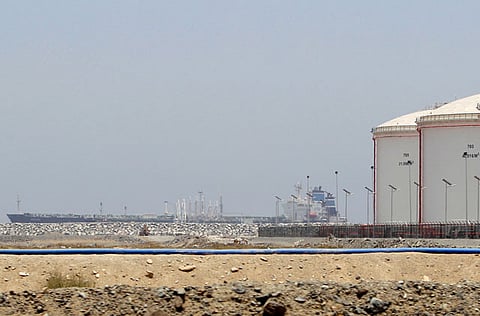Pipeline to secure UAE’s oil exports, reduce transport costs
Insurance costs could fall by upto 25 per cent as risk premiums drop

DUBAI: Exporting oil through the new Habshan-Fujairah pipeline will secure safe transportation of the UAE’s oil exports, cut insurance costs and reduce its dependence on the Straits of Hormuz, analysts told Gulf News.
The investment is an economically and politically strategic move for the UAE, they said.
“From the UAE’s perspective, this will help it to secure its most strategic economic asset against political tensions with Iran,” said Said Hirsh, analyst at London-based Capital Economics. “The pipeline is very good from the perspective of the international community as at least one step to help ease rising supply concerns from the dependence on the Strait of Hormuz.”
The UAE will be able to transport its oil exports safely in the face of Iranian threats to close the Straits of Hormuz or in case of war, said Dr. Mohammad Al Asoomi, a UAE-based economist. “The exports will not stop and therefore they can guarantee continued oil revenues.”
The pipeline could help reduce transport costs as insurance premiums within the GCC can fall by up to 25 percent, he added. Insurance, which is factored in transport costs, may drop as the risk premium falls.
Given the massive investment in Fujairah, the project is one way to balance economic development in different emirates and generate employment opportunities, Al Asoomi added. “The pipeline will support the spread of economic development in different parts of the country, not just exclusive to certain emirates, and this is very important for sustainable development in the UAE.”
Politically, the new pipeline means that the UAE is no longer dependent on the troubled Straits of Hormuz, where regional tensions have been churning amid Iranian threats to close the strategic passageway, analysts say.
“It will show Iran that the countries of the region will not take its threats lightly and that they have the means to reduce the damage if ever it occurs. It is also an invitation to Iran to follow a cooperative policy rather than force other countries into expensive means to deny Iran the possibility of threatening their exports,” Saadallah Al Fathi, former head of the Energy Studies Department in Opec Secretariat in Vienna, said in an email to Gulf News.
The presence of the pipeline dilutes Iranian threats to close off the Straits.
“It de-risks the whole fall-out quite a bit. It’s not like a shut down of the straits would not be a problem but this helps. It weakens Iran’s hold on the use of that threat and devalues it somewhat,” said Samuel Ciszuk, an oil supply consultant at KBC Energy Economics. “Iran is one of the few remaining countries that’s entirely dependent on transporting crude oil through the Straits, so that leaves Iran, Kuwait and Qatar to be exposed to the shut down of the straits.”
The new development however is unlikely to lead to a further drop in oil prices, which mainly depend supply and demand as well as speculation, analysts said.
However, it may worsen UAE-Iran relations, some analysts said.
“I think Iran will blame itself for forcing the UAE to seek other options in the face of its threats. Iran may consider the pipeline against its interests because it reduces the effectiveness of its threats. The pipeline will not contribute positively to the already strained relations between the two countries,” according to Al Fathi.
On the other hand, a “deep, fundamental mistrust” has existed for decades between the two countries, relations took a “sour turn” over the Abu Musa islands dispute and Abu Dhabi has been planning this pipeline for a long time, so relations are unlikely to be affected further, said Ciszuk.


